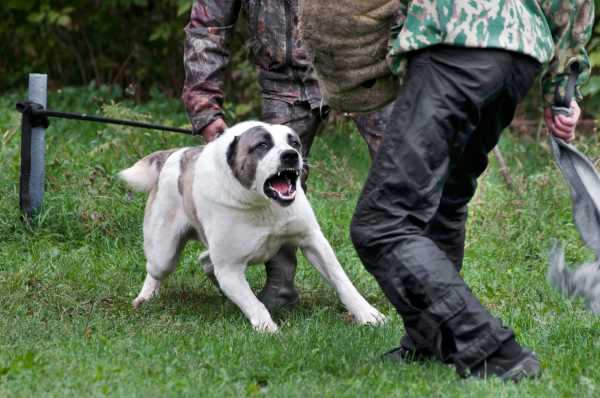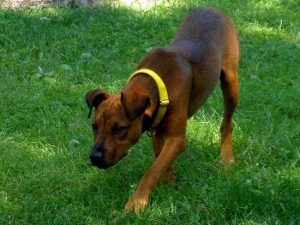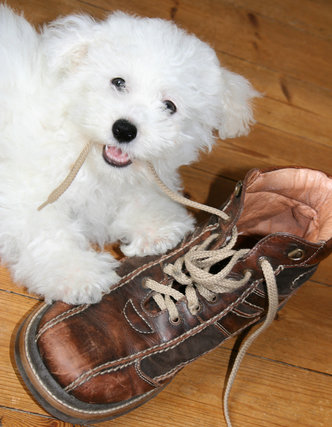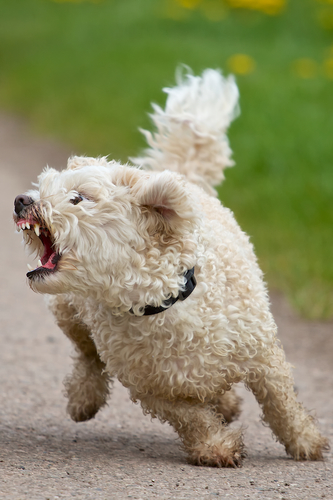Knowing why dogs bite people will help you prevent aggression issues with your Bichon Frise. While dog bites are not always predictable, with a carefully chosen dog and good training, most incidents can be avoided.
Every year in the U.S., dog bites put 14,025 people in the hospital. The average cost for a dog bite hospitalization is $18,200, which is about 50% higher than the average accident related hospitalization. With dog bites, there are often complications, like serious infections.
Sadly, some people require reconstructive surgery, some have extensive stays in the hospital, and a few never make it home. In 2020, homeowners’ insurance companies paid out $854 million in liability claims made against owners of the dogs who bit the victims.
Fortunately, not every dog bite requires hospitalization.
However, most of the dog bites that do not require emergency care, are never reported. So the issue is far more common than most people believe.
Because of all this, as pet parents, we simply cannot ignore the problem.

This article will discuss:
- Which dogs are most likely to bite a person
- Why dogs bite us
- Breeds most likely to kill
- What you do to prevent your dog from biting
- Do you have an aggressive dog? A downloadable checklist for you
Dogs most likely to bite a person
Over the years, insurance companies and veterinary organizations have gathered data to help us all understand the extent of dog aggression and how we can prevent attacks.
Certain dogs are more likely to attack a person than others:
- Frustrated dogs that are tethered or on a leash
- Male dogs that have not been neutered
- Dogs that have not been properly socialized
- Cat or small animal chasers – Every dog loves a good chase. However, when a cat stops, turns around and hisses at the dog, most dogs simply retreat. The game is over. On the other hand, if a dog continues to go after the cat, he is overly aggressive and is threatening to both you and the cat.
- Dogs that were harshly trained or trained to attack.
- Predator dogs whose instinct is to chase and attack. The sudden movements of children or a child who is running can cause a predator to chase the person. However, keep in mind that, any dog can become a predator when instinct kicks in.
The American Veterinary Medical Association Task Force on Canine Aggression and Human Interactions cites 5 factors that increase the chances of a dog biting.
I’ve added a few additional factors to the group. Each factor gives us some insight into why dogs bite other dogs or people.
Why Dogs Bite
Breed and parents of the attacking dog
Some breeds are more likely to be aggressive than others. For example, pit bulls were bred to fight. They are vicious fighters and they often attack other dogs, without provocation.
When pit bulls get into a fight with another dog, pet parents instinctively try to separate the dogs in order to protect their own dog.
Getting into the middle of a dog fight is dangerous business. A dog who is intent upon fighting with another can easily bite a person by mistake. This is often how a person is injured by a pit bull or another dog in a dog fight.
However, breed is not everything. Parental history of the sire and bitch also plays a part. Not every single pit bull or Rottweiler is dangerous, so we really can’t say that it’s always a certain breed that attacks.
And any breed dog, including Bichon Frises, will attack if the circumstances are right. The size of the dog is not an indicator of whether or not the dog will attack!
Socialization of the dog

A dog who has been exposed to all kinds of people, young and old, will be less likely to be stressed, especially around children.
Your puppy also needs to become comfortable in a number of different settings, quiet or noisy and busy. When your puppy is still young, you need to take the time to take him places with you.
Your puppy needs to be socialized before she is 14 weeks old. Just like with children, the best time for learning is when your puppy is still very young.
If poorly socialized, a dog reverts to instinct, and he is more likely to be territorial or stressed in new situations and with people he doesn’t know.
A Dog’s Training
Obviously a dog who was trained to protect or attack could be a problem in a social situation.
On the other hand, if a family pet has been poorly trained or not trained at all, he can also become dangerous.
Inadequate training and discipline can lead to a dominant dog becoming aggressive. This is true, even for a small dog like a Bichon.
Health of the Dog
A dog who is sick or was injured, or old, tired and stiff, can get snarly. This is especially true if the dog is startled or touched where he hurts.
A dog with a brain tumor, thyroid issue or an old dog with arthritis can show aggression towards people or other dogs.
Fearful Dogs
In addition to pain, fear can lead to aggression. A dog who is fearful of everything becomes defensive and then aggressive.
This is simply a form of canine self-defense. But, even though we know that a dog is protecting himself, we need to change the scenario so he is more comfortable and doesn’t attack others.
Behavior of the Victim
We usually don’t think of the victim as causing an attack. However, a baby rolling over on a bed or a young child hitting a dog can cause a dog to attack.
If a person approaches a dog quickly and startles it, or if a child pats a dog near the face, the dog can behave defensively.
While we don’t view these simple acts as provocation, your dog may view it differently.
Late Vaccinations
When a dog doesn’t get his first vaccination until after 8 weeks of life, he is more likely to be aggressive.
Un-neutered Males
Statistically, males who are not neutered are more aggressive than neutered ones. If you are not going to breed your male dog, consider having him neutered.
Males dogs are more aggressive by nature than females. In fact, of all recorded attack incidents, 70-87% of the attacks were by male dogs.
Multiple Dog Homes
This is where the pack mentality comes in. More than one dog in a home increases the chances of a dog attack on a person.
The more dogs you have, the greater the chances that one of your dogs will attack someone.
The interactions between dogs are complex, and sometimes instinct wins out over training.
New Dog or Person
A new dog in a home is dangerous for the first 60 days, and a person new to the home (say, a grandchild, mother, or mother-in-law who is visiting) is in danger of attack for the first 60 days.
Approximately 1/3 of all dog bite fatality victims were people who were living temporarily with the dog’s owner when they were attacked.
Fully 75% of these victims were children, 8 years old or younger.
Breeds most likely to kill
You may have seen information on the internet, proclaiming the “myth” of pit bulls being aggressive.
The actual fact is that, statistically, pit bulls are the most likely dog breed to attack and kill another dog or a person.
Second in line are Rottweilers.
Pit bulls, Rottweilers and Presa Canarios were responsible for 65% of canine homicides between 1982 and 2006.
Other breeds that were vicious enough to kill people include:

- German shepherds
- Huskies
- Alaskan malamutes
- Doberman pinschers
- Chows
- Great Danes
- St. Bernards
- Akitas.
Fortunately Bichon Frises are not included in this “most aggressive” group. However, we still need to work with our dogs to keep them from being aggressive.
Given the right circumstances, any breed, including small breeds, can attack and bite.
Although they were pretty far down on the list, Bichon Frises were listed as dogs who have become aggressive and attacked. We need to socialize and keep our dogs in check.
What can you do to prevent your dog from biting?
Of course, if you already have a dog, some of the following suggestions are not going to help you. However, if you are like most dog owners, you will have more than one dog in your lifetime.
Going forward, here are a few ways that pet owners can prevent their own dog from biting:
Choice of a Breed
When choosing a dog or puppy, pick a breed that is known to be more relaxed and not aggressive. This is especially important if you have children or grandchildren in your home.
Choose a Good Breeder
A good breeder will be aware of the puppies’ blood line and any problems with dogs in the line.
If you are getting a new Bichon Frise puppy, ask to see the puppy’s parents. This is a good time to observe how they interact with you, a stranger.
Socialization
This is critical to having your dog behave appropriately with family members, friends and with strangers. Start socializing your new puppy as soon as he comes into your home.
Training
When you walk your dog, maintain control of him and practice appropriate behavior when approaching other dogs or people.
Never let your dog run loose at a dog park or the beach until she has been trained properly.
If you are unsure that your dog has been trained properly to avoid aggression, you should check out the Doggie Dan system of training dogs. It’s very effective and has videos that demonstrate how to work with dog aggression.
Remember that, for most dogs, there is hope. With proper training, most dogs can become rehabilitated and less aggressive.
Children and Your Dog
Supervise any interaction with children and your dog, especially if your dog does not know the children. Do not leave an infant or young child in a room alone with any dog. Big or small, whether the dog has a history of aggression, or not.
Know your dog. If you see a situation developing where your dog may defend his territory, protect his toy, or fight for his dinner, you need to intervene before someone gets hurt.
Teach children how to approach your dog, and educate them on what they should or should not do, around your dog.
If your dog is not good with children, make sure that no child approaches your dog unless you are with them, making sure your dog behaves well.
As you can see, there are many reasons why dog bite.
Do You have an Aggressive Dog?
You may be wondering if your dog could be aggressive. I’ve developed a downloadable checklist that you can use to see if you might have an issue with your Bichon Frise.
If you say yes to any of the questions on the checklist you might have an aggressive dog. Keep in mind that any breed can be aggressive, and dogs all have different personalities.
You can download my FREE aggressive dog checklist here.






Leave a Reply